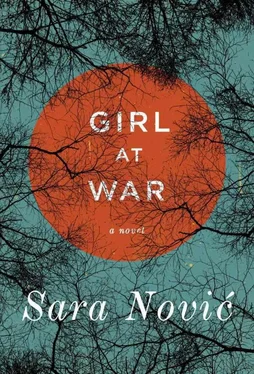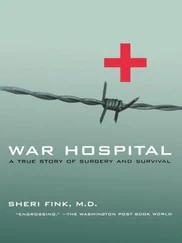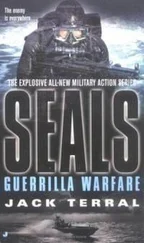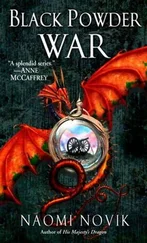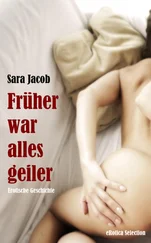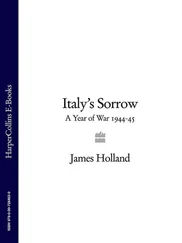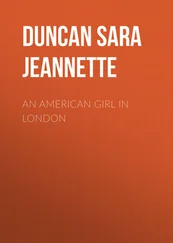Zagreb appeared relatively unharmed, and I was overwhelmed by its size and bustle, felt out of sync with the constant motion of the city. I noticed families walking together clad in khakis and patent leather and realized they were probably leaving church, that it was Sunday. The concept of time organized into seven-day units seemed almost foreign now, as if I’d never abided by the calendar. I wondered how long I’d been gone, whether I’d missed Christmas. I thought of school and was dismayed that everyone I knew had undoubtedly continued going there every day without me.
The city I had called my own, one I’d considered a war zone when I left it, now felt like neither. It was as if the whole of Zagreb had been repainted — Technicolor — the hues more vivid, the glass within each windowpane more burnished.
I stared at a family as they crossed the street, let my eyes linger too long, and their mother glared at my dirty T-shirt with the condescension reserved for gypsy beggars. For a second I wished I still had my rifle — just my holding it would have stopped her from looking at me like that — but immediately I felt ashamed of the thought. I needed to keep moving. I went to Luka’s house.
When I rang the doorbell, Luka answered, his face lighting up with one of his rare unbridled smiles. He cleared his front steps in one jump, chattering out a flurry of where-have-you-beens and what-took-you-so-longs, and I felt my throat shrivel and close. I was afraid my voice would give me away or abandon me altogether, as it had before.
Luka continued prattling as he climbed back toward his door, but I found my feet reluctant to take orders. He spun around to hurry me along, and I saw his face change in what must have been the moment he finally looked at me. I watched the seriousness return to his eyes as he scanned the stains on my shirt.
“Ana,” he said. “Where are your parents?”
“At home,” I lied in my shaky voice, but he gave me a look so piercing that I burst into tears. I felt my knees soften, and he pulled my arm over his shoulders and led me up the stairs to his room, where he sat me on the edge of the bed.
“Take it off,” he said, nodding at my shirt.
“No.”
“Take it off!”
I yanked the shirt over my head, and, eyes averted, he held out his hand. I gave it to him, and he dropped it to the floor, then dug through his own bureau until he found a satisfactory replacement.
“Stay here,” he said, and I heard him calling for his mother.
Luka returned with his mother behind him, and he took my bloody shirt from the floor and handed it to her. I hadn’t cried at all in the village, but, now that I’d started, stopping proved difficult. I cried myself a nosebleed, and Luka and his mother sat beside me as I sprawled facedown on the carpet, twisting my fingers tightly through its fibers until my hands tingled. Each time someone tried to touch me I shrugged them away, but eventually I grew tired, and when Luka’s mother reached out I didn’t recoil. The weight of her palm steadied the small of my back, and when I ran out of tears I fell asleep.
—
I woke on the floor and stared at the morning through the skylight in Luka’s ceiling. Luka’s mother was asleep in a rocking chair, and Luka was in his bed against the opposite wall. My eyes and throat were swollen and slow to react. I stood, and Luka’s mother stirred, then snapped awake when her forehead scraped against the wall. She looked at me, confused, not unfamiliarly, but unable to recall why I was standing blood-streaked and puffy in her house at six in the morning. She rubbed her temples. I followed her downstairs to the kitchen.
I sat on a stool at the counter and watched her flit between the refrigerator and the stove.
“You don’t need to tell me any details.” She spoke with caution. “But I’ll need to know some things, so I can help. We can just try yes or no questions first?”
I nodded.
“Okay. You were going to Sarajevo?”
I nodded again.
“Did you get there?”
Nod.
“Is Rahela okay?”
I nodded and hoped it was true.
“So, on the way back?” she ventured.
I didn’t move.
“Were there soldiers?”
Nod.
“Did they hurt you?”
“No,” I said.
“Did they hurt your parents?”
I stared.
“Are they okay?”
Stared harder.
“Are they coming back soon?”
“No.”
“Are they…coming back?”
I shook my head. Luka’s mother sat down and made a strange throat-clearing noise.
“What do I do?” she whispered. She was asking herself, so I didn’t try to answer. Moments later Luka’s father descended the stairs in a hurry, straightening the pins on his uniform. His bushy eyebrows arched when he saw me.
“Been a while, girlie,” he said, then, surveying my bloodied nose, he turned to his wife. “Is everything okay?”
“No,” she said. “It’s not.”
“Do you want me to call her parents?” He reached for the phone book, but Luka’s mother shot him such a pointed look that he stopped short. He sighed, then wet a napkin, and wiped the crusted blood from under my nose.
“Call Petar,” he said. He fumbled for his keys and headed off to train the newest troops.
—
Luka’s mother heated water on the stove, and I took it into the bathtub and dumped it over my head. It was warm enough, and I scrubbed myself pink until the water at my feet turned gray.
Luka stayed home from school, and we played cards on the kitchen floor. Luka’s mother was on the phone all day, speaking softly and twirling the spiral cord into an even twistier knot around her finger.
“Petar’s going to pick you up in the morning,” she said when she hung up the phone for good before dinner.
“Can’t I just stay with you?”
“You’re always welcome, honey. But Petar is your godfather, so legally—”
“I know,” I said, feeling bad for having asked.
—
Luka and I slept in his bed that night. I was glad to have him beside me, but the mattress I had been jealous of now seemed sterile and unwelcoming, and I longed for my couch. Luka threw an arm over me and said, “So?” and I spilled the most complete version of the story I could, telling it like I couldn’t to his mother, like I never did to anyone else. I told him about the roadblock and the forest and my father and me tricking the soldiers, the Safe Housers, the bug-eyed captain and how he’d named me Indiana. I told him about Damir, the bus full of bodies, right up to the point where I’d shown up on his doorstep. I told him about my gun.
“Forward grip, gas chamber, cleaning rod, bolt, frame, magazine, function check,” Luka repeated, mimicking my hand motions.
“You’re fast.”
“Did you kill anyone?”
The soldier in the field was the only thing I’d left out of my story. “I don’t know,” I said, which was technically the truth.
We went quiet again, but I could feel him awake, and we stayed listening to the bura wind like that, eyes wide and blind in the dark.
—
Petar had called to say he was on his way. Luka’s mother was buzzing between rooms dusting and straightening, and I followed her around.
“What is it?” she said.
“I need my shirt back.”
“I don’t think—”
“Please.”
She pulled the shirt from the bottom of her bureau drawer as if she’d known I’d ask for it.
“Maybe you shouldn’t put it on, though,” she said, handing it to me. I nodded and tucked it into the plastic bag with Damir’s sweatshirt. By this time the shirt had been washed by several hands, but the stains remained.
Petar was fit from his stint in the army, his hair growing in from his crew cut, his arm strapped in a thick plastic brace, which I assumed was the reason he was back early. He bent to one knee to hug me, then seemed to find it difficult to stop, because he scooped me up with his good arm and held me that way until we got out to the car.
Читать дальше
